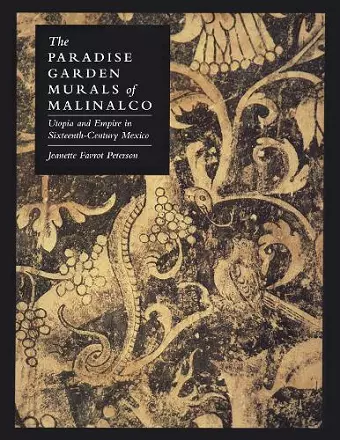The Paradise Garden Murals of Malinalco
Utopia and Empire in Sixteenth-Century Mexico
Jeanette Favrot Peterson author
Format:Paperback
Publisher:University of Texas Press
Published:1st Mar '93
Currently unavailable, and unfortunately no date known when it will be back

"... a significant contribution to the field ... it reveals the religious and political functions of painting as a part of the colonizing program of Spain." -- Francois-Auguste de Montequin, Professor and Chair of Art History, Virginia Commonwealth University
How the wall paintings at the Augustinian monastery of Malinalco promoted the political and religious agendas of the Spanish conquerors while preserving a record of pre-Columbian rituals and imagery.
Winner, Charles Rufus Morey Award, 1993
The valley of Malinalco, Mexico, long renowned for its monolithic Aztec temples, is a microcosm of the historical changes that occurred in the centuries preceding and following the Spanish conquest in the sixteenth century. In particular, the garden frescoes uncovered in 1974 at the Augustinian monastery of Malinalco document the collision of the European search for Utopia with the reality of colonial life.
In this study, Jeanette F. Peterson examines the murals within the dual heritage of pre-Hispanic and European muralism to reveal how the wall paintings promoted the political and religious agendas of the Spanish conquerors while preserving a record of pre-Columbian rituals and imagery. She finds that the utopian themes portrayed at Malinalco and other Augustinian monasteries were integrated into a religious and political ideology that, in part, camouflaged the harsh realities of colonial policies toward the native population.
That the murals were ultimately whitewashed at the end of the sixteenth century suggests that the "spiritual conquest" failed. Peterson argues that the incorporation of native features ultimately worked to undermine the orthodoxy of the Christian message. She places the murals' imagery within the pre-Columbian tlacuilo (scribe-painter) tradition, traces a "Sahagún connection" between the Malinalco muralists and the native artists working at the Franciscan school of Tlatelolco, and explores mural painting as an artistic response to acculturation.
The book is beautifully illustrated with 137 black-and-white figures, including photographs and line drawings. For everyone interested in the encounter between European and Native American cultures, it will be essential reading.
ISBN: 9780292769175
Dimensions: unknown
Weight: 454g
246 pages